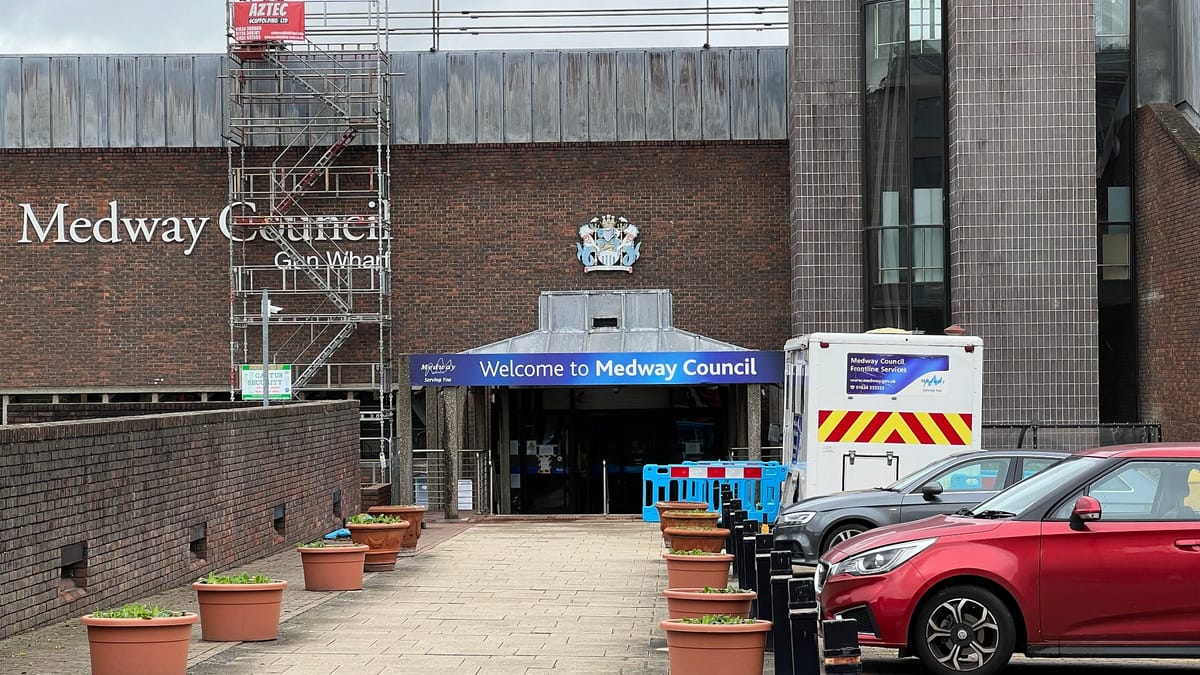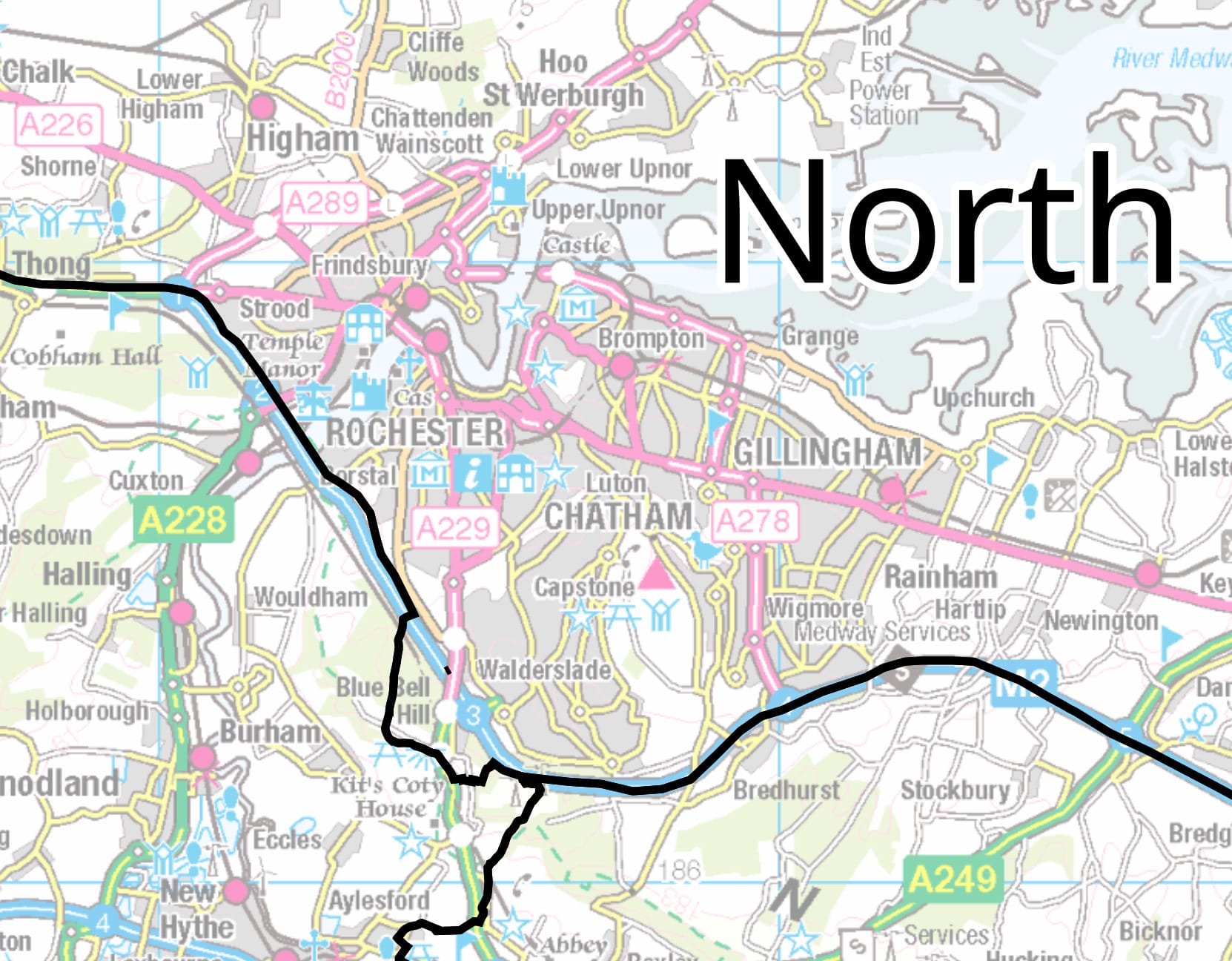When exceptional support is no longer exceptional
Plus Medway offers own proposal for future council map that annoys everyone, news in brief, and more

In the four years we’ve been doing this, we’ve had to write repeatedly about the budget woes at Medway Council. Six months since the last budget was passed, it’s time to start looking ahead next year, and unsurprisingly, Medway will once again struggle to balance the books. Just how exceptional is ‘exceptional financial support’ if a council needs it every year? Further down, we have news of a Medway Council plan for the future layout of Kent councils that have gone down about as well as a warm cup of sick, news in brief, and more.
When exceptional support is no longer exceptional
Medway Council has published its latest Medium Term Financial Outlook and, once again, it begins and ends with another government bailout. Exceptional Financial Support, which by name should be a last resort, has become the normal way the council gets through each year. The report is due to be discussed at next week’s Cabinet meeting, and while the numbers are intimidating, they follow the same pattern seen across much of local government.

For 2025/26, the budget was only balanced thanks to £18.5m of this support. Without it, the council would not have been able to set a legal budget. Despite that, the first set of monitoring figures for this year shows a projected £10.9m overspend, larger than the reserves the council has left.
The forward look is no better. Next year’s gap is £29.9m, with the shortfall rising each year to £61.6m by 2029/30. Across the five-year period, the cumulative deficit stands at £191m. The report is candid that Medway must return to government for further support to make the numbers add up.
The pressures driving this cycle are well known. Adult Social Care is projected to cost £19m more next year as more people need help and the cost of provision rises. Children’s Services continue to grow too, with more placements required and inflation eating into budgets. Special Educational Needs transport is another cost that keeps increasing, alongside homelessness and temporary accommodation, where bills are set to rise by another £1m next year. Basics like staff pay awards, energy, waste contracts, and highway maintenance continue adding millions more.
On the income side, growth continues to not keep up. Council tax will rise by the maximum of 5% each year, covering only part of the extra spending. Business rates remain flat, and long-promised government funding reforms still appear to be some way off. As a result, reserves are minimal. By March 2026, the council expects to have £11.6m in general reserves, less than 2% of its annual budget. The finance officer has incredibly optimistic ambitions to raise that to 5% by 2030, but with the deficits set out above, it is hard to see how that happens.
The report nods to the spectre of a Section 114 notice, the formal declaration that a council cannot balance its budget. In theory, Medway is always one step away from that. In practice, it is unlikely to happen. The government has already signed off two rounds of Exceptional Financial Support and shows no interest in letting councils collapse. Dozens of others are in similar positions, and ministers appear more comfortable signing off annual bailouts than dealing with the fallout of mass bankruptcies.
Of course, Medway itself may not even be around much longer. With plans for local government reorganisation moving forward, the council will likely be merged into a new, larger unitary authority (more on that below!) before the decade is out. That means the mounting debt and reliance on bailouts will not just be Medway’s problem. It will presumably be passed on to whichever new body takes over, saddling its successor with the consequences of years of spiralling costs and fragile finances.
That might keep things on track for now, but it is hardly a solution. Support has become a business model, services are pared back year after year, overspends are racking up, and every financial year ends with another plea to government. What was meant to be ‘exceptional’ is now routine. And with Medway’s time as a council limited, Medway’s financial woes look set to be handed over to a new authority that will start life weighed down by years of bailouts.
Could you help us get the word out? If you enjoy Local Authority, please share it with your friends, family, associates, and even your enemies. We have no meaningful marketing budget, so we rely on word of mouth from our readers to find new readers. Refer just two new readers and we’ll comp you a free month of our paid subscription. Details here.
Medway draws its own map and annoys everyone
Medway Council has thrown a grenade into Kent’s local government reorganisation by publishing its own map for how the county should be carved up, seemingly without consulting anyone else in advance. The plan would split Kent into four new unitary authorities, with Medway folded into a ‘North Kent’ council running from Dartford to parts of Swale.

The council insists the proposal is based on population data, infrastructure, and government demands for bigger councils. Leader Vince Maple calls it the “perfect opportunity” to redraw boundaries and argues Medway’s 25 years as a unitary shows that the model works. He also claims the new structure would improve services, make councils more accountable, and boost growth.
Medway is the only existing unitary in Kent, handling all services since 1998. The government has said future councils should cover around half a million people, leaving Medway’s 280,000 rather short. Change is coming whether people want it or not, and Medway has nailed its colours to the mast of a four-council model as the best way forward.
The council says the four-unitary option is only one of several being considered. Medway stresses it was agreed by all Kent councils that it would take the lead in drawing up this version, which explains why it has now appeared. Even so, the announcement dropped at a meeting of Kent’s council leaders before being quickly released to the press has left others unhappy to say the least.
Conservative opposition leader in Medway, George Perfect, accused the Labour administration of wrecking months of collaborative work. He said the plan “breaches red lines” and ignores communities and their elected representatives. Tonbridge and Malling leader Matt Boughton went further, branding the move “appalling and disrespectful” after seeing Walderslade and Blue Bell Hill shifted into the proposed North Kent council. “We will not let Medway break us apart,” he said.
Other models remain on the table. Some councils prefer three unitaries, splitting Kent into east, west and north. A single giant Kent unitary, swallowing Medway back into the county it left in the 1990s, is still technically an option and preferred by Kent County Council, but unlikely to gain much traction. None of these ideas has consensus across the county, and the clock is ticking, with a business case due to government in November.

From a purely Medway perspective, there are some sensible rationalisations of the border in Medway’s four-unitary proposal. The border would follow the A2/M2 corridor, providing a natural edge to our towns, where currently slightly chaotic lines dominate. Chunks of Lordswood and Walderslade currently sit outside of Medway, which would bring them under the control of one council. The plans would also see the north authority annexing Blue Bell Hill and facilities like Buckmore Park kart circuit. But where Medway taketh, Medway also giveth away. Most notable would be Cuxton and Halling being left within the proposed west authority.
Whether anyone else lines up behind Medway’s plan remains to be seen. What is clear is that the council, which has existed since the 1990s, will not survive in its current form. Within a few years, decisions on schools, bins, and social care will be taken by a much larger body. Medway wants that future to be a North Kent council with Medway at its centre. Whether they will get their way remains to be seen.
Community newsroom
Four years into this project, our readers remain our best source of information on what’s really going on in our towns. As such, we’re going to try something a little different. We’re going to tell you some of the stories we’re currently working on, and if you can shed any light on the issues we’re looking at, we’d love to hear from you!
- We’re looking at the proliferation of HMOs across Medway, which can be a charged issue within communities. Whether you’re living in a HMO, near one, or have general insights on their impact on our towns, please get in touch.
- We had a great response to our story last week on the Medway Green Party and the claims of a ‘coup’ within it. Some people have come forward with more information since we published, but we’d love to hear from others with knowledge of the situation.
If you can help with either of these stories, or anything else that might be of interest, you can reach us via hello AT localauthority DOT news - we’re always happy to talk off the record in the first instance…
In brief
🏗️ Medway Council officers recommend that councillors approve a 132 development on the Acorn Wharf shipyard in Rochester. The shipyard, which has proved surprisingly combustible in recent years, would be replaced by three blocks of one and two-bedroom flats, and a commercial building hosting a cafe and community space.
⚽ At the same planning meeting next week, approval is also recommended for the installation of floodlights over the sports pitch at St John Fisher School in Rochester.
☕ A cafe in Rainham that closed after claiming parking fees drove them out of business has reopened and is now complaining that parking fees might drive them out of business.
More Authority
For our weekend interview, we sat down with Jacob Granger, who has been on quite a journey from setting up a DIY music venue in Gillingham to becoming the community editor and podcast host at journalism.co.uk. We talk to him about his role, mental health in journalism, his advice for potential podcasters, and lots more.

Don’t forget, through August, you can get 25% off the usual price for a full year of Local Authority subscription. We can only do all of our work with the support of the readers who choose to pay for it, so we’d love to have you on board if you aren’t already.
Footnotes
Follow us on social media! We’re on Facebook, Instagram, BlueSky, and Threads, but not that other one.
Music that soundtracked the creation of this edition: No Blues by Los Campesinos!, Maladroit by Weezer, and Mono No Aware by Johnny Foreigner.






